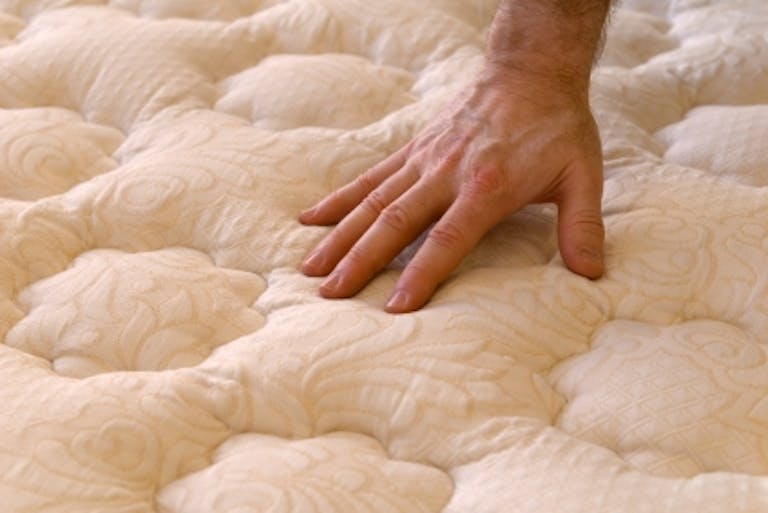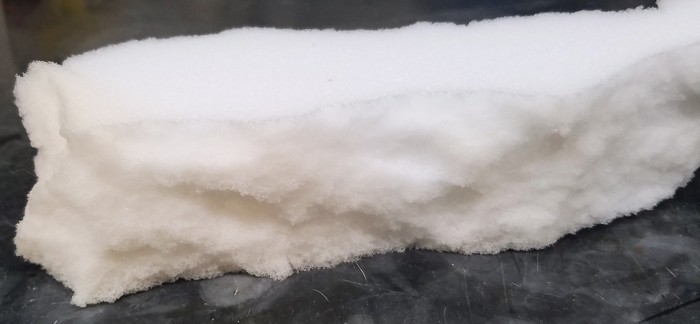Polyurethane shows up in all sorts of consumer products: seat cushions in furniture and vehicles, car bumpers, shock-absorbing sneaker soles, and more. The global market for polyurethane was over $19 billion last year, and when those products wear out they generate vast quantities of waste—more than 1 million metric tons annually in the US alone. But the very thing that gives polyurethane its strength and durability—crosslinked polymer chains—makes it tough to reprocess into new products of comparable value. Instead of dumping it into landfills or “downcycling” it to make carpet padding, a group of researchers has shown they can break those crosslinks and reform the material to use in new products of similar commercial value to the original (ACS Cent. Sci., 2020, DOI: 10.1021/acscentsci.0c00083).
The Urethane Blog
Everchem Updates
VOLUME XXI
September 14, 2023
Everchem’s exclusive Closers Only Club is reserved for only the highest caliber brass-baller salesmen in the chemical industry. Watch the hype video and be introduced to the top of the league: — read more
May 6, 2020
Huntsman (HUN) Presents At Wells Fargo Virtual Industrial Conference – Slideshow
The following slide deck was published by Huntsman Corporation in conjunction with this event.
See the slides here: https://seekingalpha.com/article/4343747-huntsman-hun-presents-wells-fargo-virtual-industrial-conference-slideshow?utm_medium=email&utm_source=seeking_alpha&mail_subject=hun-huntsman-hun-presents-at-wells-fargo-virtual-industrial-conference-slideshow&utm_campaign=rta-stock-article&utm_content=link-2
May 6, 2020
Huntsman (HUN) Presents At Wells Fargo Virtual Industrial Conference – Slideshow
The following slide deck was published by Huntsman Corporation in conjunction with this event.
See the slides here: https://seekingalpha.com/article/4343747-huntsman-hun-presents-wells-fargo-virtual-industrial-conference-slideshow?utm_medium=email&utm_source=seeking_alpha&mail_subject=hun-huntsman-hun-presents-at-wells-fargo-virtual-industrial-conference-slideshow&utm_campaign=rta-stock-article&utm_content=link-2
May 6, 2020
News provided by May 04, 2020, 09:00 ET WASHINGTON, May 4, 2020 /PRNewswire/ — A group of American mattress manufacturers and their workers applaud the U.S. Department of Justice’s decisive action to withdraw a statement of interest made in the U.S. International Trade Commission’s investigation concerning the impact of dumped and subsidized mattress imports on the American mattress industry. In late April, the Competition Policy and Advocacy Section filed a non-party statement of interest on the ITC’s docket. Two days later, the International Sleep Products Association, the industry association that includes companies on both sides of the ITC investigation, filed a detailed response that noted the lack of any factual basis for that statement. Within a week, DOJ has now withdrawn the statement. “The statement of interest was not based on facts or any established process for gathering those facts,” said Yohai Baisburd, counsel to the Mattress Petitioners. “We were confident, however, that once DOJ became aware of the substantial unutilized capacity of the domestic industry to produce mattresses and the thousands of mattresses the industry continues to provide to hospitals and nursing homes across the country during the COVID-19 pandemic, the statement of interest would either be modified or withdrawn. We are grateful that DOJ leadership chose to quickly research the facts and withdraw the statement.” “The truth is, every day, American companies and workers are being injured by unfair trade practices,” said Baisburd. “Congress has given U.S. industries and workers the tools to address these unfair trade practices and the criteria the International Trade Commission must apply. Why they initially sought to inject themselves in a Congressionally mandated process designed to ensure fair competition for American workers and American companies is a mystery. It is heartening that senior leadership at Justice took immediate decisive action to withdraw the statement.” Since 2017, more than 40 American mattress manufacturers have been forced to close their doors due to massive increases in the volume of unfairly traded imports – negatively impacting thousands of American workers across the entire country. Those thousands of American workers were thrown out of work by unfair trade practices, and the surviving mattress manufacturers have been forced to cut hours and wages for remaining workers. “During these times of substantial injury by reason of imports, the domestic industry mobilized immediately and are fighting on the front lines of this war against an invisible enemy,” said Baisburd. He continued, “It really is a testament to the strength of the America spirit that these companies and workers can be meeting this challenge head-on while also petitioning for fair trade in the face of surging unfairly traded imports.” The Mattress Petitioners, a group of American companies and unions who petitioned the ITC and Commerce Department to investigate these unfairly traded import practices, is requesting that Commerce and the ITC use a Congressionally mandated process to independently investigate whether unfair trade exists and is materially injuring U.S. producers and American workers. The Mattress Petitioners include Brooklyn Bedding, Corsicana Mattress Company, Elite Comfort Solutions, FXI, Inc., Innocor, Inc., Kolcraft Enterprises Inc., and Leggett & Platt, Incorporated, as well as the International Brotherhood of Teamsters and the United Steel, Paper and Forestry, Rubber, Manufacturing, Energy, Allied Industrial and Service Workers International Union, AFL-CIO. https://www.prnewswire.com/news-releases/mattress-petitioners-applaud-reversal-by-us-department-of-justice-in-trade-dispute-301051424.htmlMattress Petitioners Applaud Reversal by U.S. Department of Justice in Trade Dispute

May 6, 2020
News provided by May 04, 2020, 09:00 ET WASHINGTON, May 4, 2020 /PRNewswire/ — A group of American mattress manufacturers and their workers applaud the U.S. Department of Justice’s decisive action to withdraw a statement of interest made in the U.S. International Trade Commission’s investigation concerning the impact of dumped and subsidized mattress imports on the American mattress industry. In late April, the Competition Policy and Advocacy Section filed a non-party statement of interest on the ITC’s docket. Two days later, the International Sleep Products Association, the industry association that includes companies on both sides of the ITC investigation, filed a detailed response that noted the lack of any factual basis for that statement. Within a week, DOJ has now withdrawn the statement. “The statement of interest was not based on facts or any established process for gathering those facts,” said Yohai Baisburd, counsel to the Mattress Petitioners. “We were confident, however, that once DOJ became aware of the substantial unutilized capacity of the domestic industry to produce mattresses and the thousands of mattresses the industry continues to provide to hospitals and nursing homes across the country during the COVID-19 pandemic, the statement of interest would either be modified or withdrawn. We are grateful that DOJ leadership chose to quickly research the facts and withdraw the statement.” “The truth is, every day, American companies and workers are being injured by unfair trade practices,” said Baisburd. “Congress has given U.S. industries and workers the tools to address these unfair trade practices and the criteria the International Trade Commission must apply. Why they initially sought to inject themselves in a Congressionally mandated process designed to ensure fair competition for American workers and American companies is a mystery. It is heartening that senior leadership at Justice took immediate decisive action to withdraw the statement.” Since 2017, more than 40 American mattress manufacturers have been forced to close their doors due to massive increases in the volume of unfairly traded imports – negatively impacting thousands of American workers across the entire country. Those thousands of American workers were thrown out of work by unfair trade practices, and the surviving mattress manufacturers have been forced to cut hours and wages for remaining workers. “During these times of substantial injury by reason of imports, the domestic industry mobilized immediately and are fighting on the front lines of this war against an invisible enemy,” said Baisburd. He continued, “It really is a testament to the strength of the America spirit that these companies and workers can be meeting this challenge head-on while also petitioning for fair trade in the face of surging unfairly traded imports.” The Mattress Petitioners, a group of American companies and unions who petitioned the ITC and Commerce Department to investigate these unfairly traded import practices, is requesting that Commerce and the ITC use a Congressionally mandated process to independently investigate whether unfair trade exists and is materially injuring U.S. producers and American workers. The Mattress Petitioners include Brooklyn Bedding, Corsicana Mattress Company, Elite Comfort Solutions, FXI, Inc., Innocor, Inc., Kolcraft Enterprises Inc., and Leggett & Platt, Incorporated, as well as the International Brotherhood of Teamsters and the United Steel, Paper and Forestry, Rubber, Manufacturing, Energy, Allied Industrial and Service Workers International Union, AFL-CIO. https://www.prnewswire.com/news-releases/mattress-petitioners-applaud-reversal-by-us-department-of-justice-in-trade-dispute-301051424.htmlMattress Petitioners Applaud Reversal by U.S. Department of Justice in Trade Dispute

May 6, 2020
Nudging reaction in reverse repurposes polyurethane foam
New polymer processing method offers a path to recycle a huge class of consumer goods
by Neil Savage, special to C&EN

Polyurethane is a type of plastic known as a thermoset, which is cured by heat in a usually irreversible reaction. Dibutyltin dilaurate catalyzes the crosslinking reaction of the polyurethane chains as the material cures. But it turns out that at the right concentration and elevated temperatures, it both breaks and forms bonds within the material. So to break the material down, the researchers added the tin catalyst to rigid pieces of polyurethane foam and heated the material to 160° C. “We add a little bit more of [the catalyst] and that allows the reverse reaction to occur alongside the forward reaction,” says Daylan Sheppard, a graduate student in William Dichtel’s lab at Northwestern University and lead author of the paper. Because the reaction goes forward and backward, the polyurethane can be remolded.
The catalysis process breaks only a few of the crosslinks at a time, so the material never fully breaks down, Dichtel says, and the extrusion process puts mechanical stress on the material to change its overall shape. Making old polyurethane films into new films was relatively straightforward. But first attempts at reprocessing polyurethane foam into film or threadlike filaments led to cracks in the new material because of air trapped in the original foam. To combat that problem, the researchers used a pair of turning screws to force out the excess air as they extruded filaments or films.
When the team tested their method on actual consumer products, which can contain additives like flame retardants, they found such additives did not affect the reprocessing.
Steven Zimmerman, a chemist at the University of Illinois Urbana-Champaign, says the fact that researchers demonstrated the technique on commercial products is important because it shows the method can be applied to real-world materials. It’s also significant that the team recycled foams. “Previous work has focused on PU films, which are a lot easier to reprocess,” Zimmerman says. Foams “not only are most challenging but also represent the largest portion of the waste stream.” Foam is two-thirds of commercial polyurethane products.
Sheppard says producing recycled films is useful, because they’re used for rigid products such as bumpers, but given foam’s prevalence the team will work toward also making foam from the reprocessed material to broaden the types of products the process could create. They are also trying to find a more environmentally friendly catalyst without tin, Dichtel says. And they’re hoping this work might suggest new ways of dealing with other, chemically different crosslinked plastics. “The circularity of plastics really needs to improve,” Dichtel says, “and this is a small step in that very large goal.”
https://cen.acs.org/environment/recycling/Nudging-reaction-reverse-repurposes-polyurethane/98/i17

